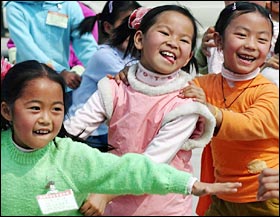Most urban dwellers believe that nowadays, the only advantage of holding a residence card in a big city is that it means cheaper tuition when their children enter school. But for the floating population, especially migrant workers, schooling for the kids has become a huge headache.
They have two options: public schools and schools for children of migrant workers.
Currently, the parents of 170,000 of the 240,000 transient school-aged children in Beijing, or 71.4 percent of the total, prefer public schools. But non-resident students are required to pay extra tuition amounting to 200 yuan (US$24.16) per semester in primary school and 500 yuan (US$60.41) in middle school.
Most of those who simply cannot afford the fees send their kids to one of the 280 immigrant-operated schools for transients. Some 68,000 children are enrolled in these makeshift schools, many of which lack qualified teachers, equipment and other facilities. Education departments in many cities are beginning to crack down on these illegally operated institutions.
The extra fee for public schooling was based on the principle that compulsory education is generally supported by local expenditure. Without local permanent residence registration, the migrant workers were not allowed to share local public educational resources. However, the floating population has played an increasingly important role in the city's construction and development, and their contribution to local economic growth has now been recognized. Thus, their children should enjoy the same rights to free public education that the local kids do.

In September 2003, the General Office of China's State Council issued a document concerning children of migrant workers receiving the compulsory education in cities. It urged local governments to reduce or cancel extra fees for immigrant workers.
Beijing is actually taking several steps to resolve the education problem for transients. In addition to canceling the extra fees, all district and county governments will receive education appropriations based on the actual number of students in the schools, rather than only the number of registered permanent residents. Moreover, the municipal budget office will establish a special fund for transient students' education and provide subsidies to districts and counties where there are large migrant populations.
The new regulation enables the parents save as much as 1,000 yuan (US$120.82) every year, a substantial sum to people who are on the lower rungs of the income ladder.
(China.org.cn by Li Xiao April 28, 2004)

